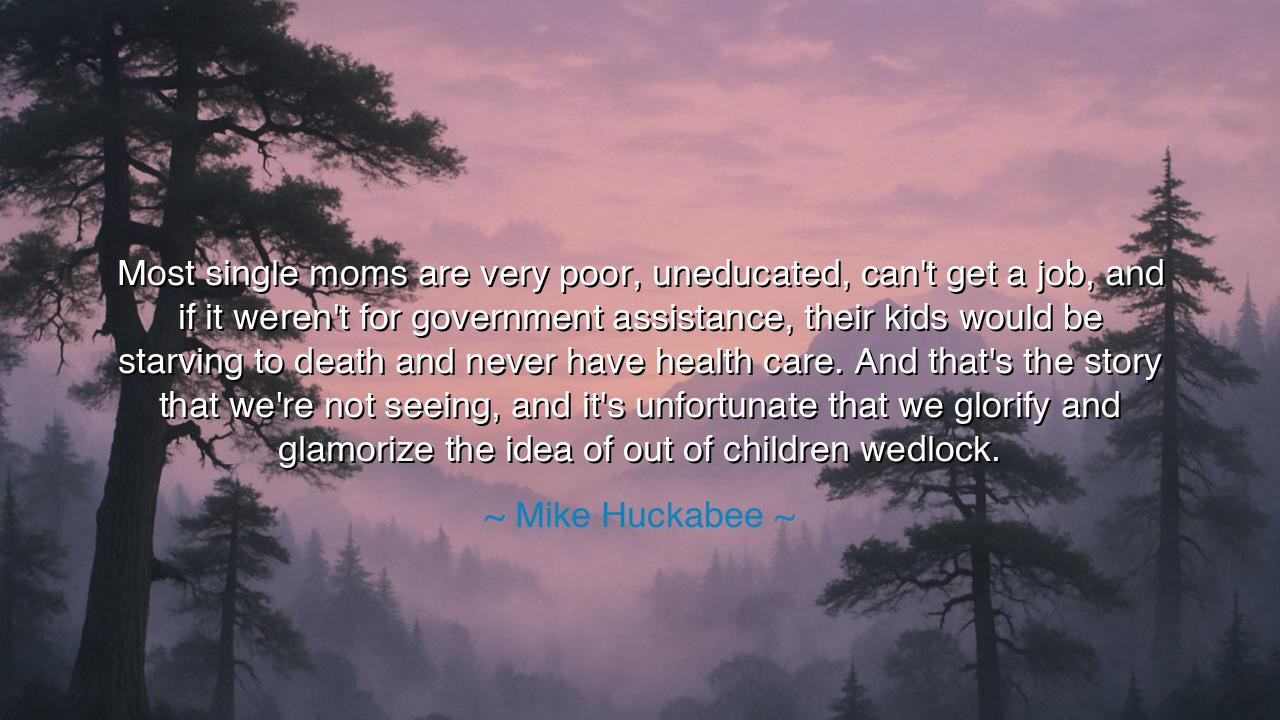
Most single moms are very poor, uneducated, can't get a job, and
Most single moms are very poor, uneducated, can't get a job, and if it weren't for government assistance, their kids would be starving to death and never have health care. And that's the story that we're not seeing, and it's unfortunate that we glorify and glamorize the idea of out of children wedlock.






In the shadow of modern comfort and the glitter of entertainment, Mike Huckabee spoke with the gravity of one who sees a deeper wound beneath the surface: “Most single moms are very poor, uneducated, can’t get a job, and if it weren’t for government assistance, their kids would be starving to death and never have health care. And that’s the story that we’re not seeing, and it’s unfortunate that we glorify and glamorize the idea of children born out of wedlock.” These are not words of scorn, but of sorrow; not condemnation, but a plea for truth in an age that trades wisdom for spectacle.
Huckabee’s words arise from the heart of America’s long struggle between appearance and reality. In a world where media glows with the beauty of independence and the thrill of rebellion, he reminds us that beyond the screen lies a harsher truth—a truth of mothers laboring alone, of children growing in hunger and uncertainty. He does not attack the woman who raises her child by herself; rather, he laments a society that celebrates struggle without alleviating it, that praises endurance while refusing to offer compassion. His concern is not moral judgment, but moral blindness—that we have forgotten to see suffering for what it is.
The ancients knew this danger well. In the days of Athens, the philosopher Solon warned that when a city glorifies what brings harm and mocks what sustains virtue, decay has already begun. A society that honors the appearance of freedom without the foundation of support destroys the very people it claims to liberate. In the same way, Huckabee’s words echo that ancient wisdom: that liberty without structure, compassion without truth, leads not to flourishing, but to quiet despair.
Consider, too, the story of Mary Harris “Mother” Jones, who in the early twentieth century walked among the widows and working mothers of the industrial age. She saw how women, abandoned by circumstance or by men, bore the weight of both labor and love. She did not romanticize their pain; she organized for their protection. She demanded wages, schools, and care for their children. Hers was the kind of compassion that Huckabee’s quote calls us to remember—a compassion that acts, not one that merely applauds survival.
Huckabee’s warning also reaches beyond economics into the spiritual realm. When he speaks of glorifying and glamorizing the breaking of family, he speaks of the human longing for wholeness. Every child, in the secret chamber of the heart, yearns for stability; every parent longs for help in the raising of the young. Yet the modern world, proud in its independence, forgets that no one was meant to raise a child alone. The old villages understood this—neighbors helped feed one another’s children, elders taught the young, and families wove their fates together. But in our time, the threads have come undone.
The true meaning of Huckabee’s words, then, is not cruelty but responsibility. He calls upon the people to look again at the cost of broken systems and absent compassion. If we would heal what he laments, we must do more than criticize the mother or shame the poor—we must restore the fabric of community. It is not enough for governments to dispense aid; the people themselves must offer understanding, education, and fellowship. The readjustment of values he speaks of is not about punishing mistakes, but about rebuilding the moral soil from which strong families grow.
Let this, then, be the lesson carried forward: Do not glamorize what causes pain; do not shame those who suffer. Instead, build a world in which suffering need not be glorified because it no longer exists in such cruel abundance. Let us honor the single mother not for her isolation, but for her perseverance—and let that honor drive us to ensure that fewer must walk her path alone. For when a society remembers its duty to its weakest, when it shelters the child and uplifts the parent, it becomes once more a place of light. And in that light, both truth and mercy can dwell together.






AAdministratorAdministrator
Welcome, honored guests. Please leave a comment, we will respond soon